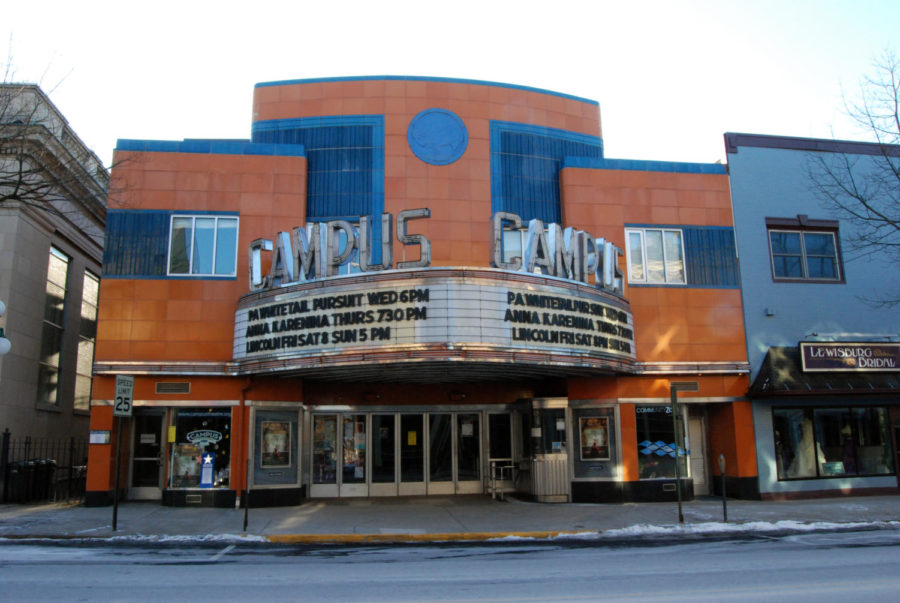Premiering: The Campus Theatre- Spotlighting the Campus Theatre’s History
September 8, 2021
Downtown Lewisburg’s Market Street is home to a combination of modern retailers and eateries alongside traditional institutions, which hold historical significance to the borough. One of these treasured landmarks is the Campus Theatre. The Theatre, built in 1941, is one of the few remaining single-screen Art Deco movie houses dedicated to promoting cinema and historic preservation. “There is no other place like it,” according to the Campus Theatre’s website.
Film & Media studies professor Eric Faden describes the history behind the Theatre’s construction. According to Faden, the Steifel Brothers ran a movie theater empire spanning New York, New Jersey and Pennsylvania. They would come to be responsible for the establishment of 11 Pennsylvanian theaters. The Brothers initially managed a much smaller theater where Cole’s Hardware is today. They saw promise in Lewisburg as a cultural center in the greater Susquehanna Valley and took a chance to build a larger theatre with hopes to fill 25 percent of the community. David Supowitz, the architect behind the Campus Theatre, designed the new Market Street Theatre, the Philadelphia Film Center, the Roxy Theatre in Northampton, Pa. and the Harbor Square Theatre in Stone Harbor, NJ. The brothers took a leap of faith building a city theater in a suburb of rural America.
January 17, 1941, marked the Campus Theatre’s opening night exhibiting the 1940 Jack Benny and Fred Allen musical comedy, “Love Thy Neighbor.” The Theatre attracted large audience numbers, being the only air-conditioned Theater in Central Pennsylvania. Long-time Lewisburg resident, Carol Brann, spent most of her childhood at the Theatre, her mother a cashier and her father the projectionist working an amassed 80 years for the Theatre. She would eventually start working there when she turned 14. The Theatre was indeed a place for everyone. Every Saturday, the Steifels offered free movies for the local kids and even showed double features if they were lucky.
The Theatre has always been a deeply uniting pillar of the community. Former Mayor of Lewisburg, Judy Wagner, takes us back, “Nobody could walk downtown without seeing Harold [Steifel] resting atop a meter, greeting everybody, talking to everybody.” In addition, Harold Steifel and his wife, Jacquie, worked closely with the community to start many outreach programs through the Theater. Bringing a big-city entertainment venue to small-town Lewisburg was a financial risk, but it definitely helped to have a University around the corner.
Faden purchased the Theatre in 2001 from the Steifel Family to start The Campus Theater Ltd. as a non-profit organization. The University eventually took formal ownership of the Theater’s building by 2006 and leased it to the organization for just $1 a year.
Under Bucknell’s ownership, the Theatre underwent a $2.5 million six-month refurbishment in 2011. To preserve the historical heritage of the Theatre and maintain its place in the community, Bucknell University undertook a major renovation. Bucknell alumnus John Hartmann ’79, applied his BA in Art and Chemistry to the forefront of the near and dear project to his heart. Hartmann and his team of theater staff, along with the University’s Engineering and Design department, repaired lost architecture, upgraded its systems and infrastructure and installed state-of-the-art theater movie and sound systems. Hartmann said, “I am proud of the work that we have done here and also, as a Bucknell student, I have the chance to come back here and work on something like this. It is going to be wonderful for the future of this town and the University. And I look forward to coming back here for years.”
Even though the Campus Theatre is an independent entity and non-profit, the University provides financial support to keep it relevant in a new world of streaming services. In addition, the Film/Media Studies department has nurtured a great partnership with the Theatre through stewardship and preservation of the architectural wonder this Theater is in the 21st century. According to its website, “The Campus Theatre is committed to presenting diverse film programming with a healthy balance of popular, fine art and independent films that are culturally relevant and bring understanding to contemporary concerns.”
The orange and blue tile exterior and the bison emblem front and center clearly represent the bond between the University and the Theatre. The neon letters of the vintage marque pop out into the street and can be spotted from down the road. The immaculate interior design of the lobby and auditorium has retained much of the original Art-Deco elements. The University’s influence even lies throughout the building’s interior if you look close enough. It keeps a more muted orange and blue color theme in its murals. The auditorium itself holds two massive murals of Greek-like sculptures, a male and female stand directly across from each other. Before the lights dim, the chandeliers bring light to the floor-to-ceiling detail. Then, as the red velvet curtain draws unveiling the screen, the Theatre transports you to another place at another time.
The heightened viewing experience the Theatre offers is unlike anything in today’s modern world. So instead of choosing to watch the newest movie on Netflix, go to the Theater for an immersive viewing experience. Take an hour to escape the occasional monotony of campus life and travel to another world the Theatre has to offer.
Visit the Campus Theatre website https://www.campustheatre.org/find-us for information and showtimes or pop in for a visit. It’s only a five-minute walk from campus! They run a show every night, and screenings are free to the public on Mondays, Tuesdays and Wednesdays, thanks to the Film/Media Studies department.






















